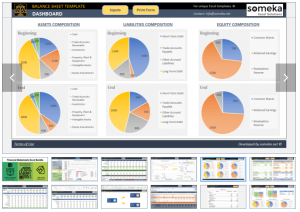Zero Based Budgeting vs Traditional Budgeting: A Comprehensive Guide for Personal Finance and Small Businesses
In today’s competitive world of personal finance and small business management, having an effective budgeting strategy is crucial to achieve your financial goals. Two of the most popular budgeting methodologies used are Zero-Based Budgeting (ZBB) and Traditional Budgeting. In this comprehensive blog post, we will dive deep into these two approaches, exploring their advantages, disadvantages, and how they can be implemented for your personal finances and small businesses in both the UK and the US.
Zero-Based Budgeting, as the name suggests, starts from a “zero base,” where every expense or cost must be justified, and nothing is presumed to carry over from the previous budgeting period. This approach has some notable advantages such as increased accountability and the potential for cost savings. On the other hand, Traditional Budgeting is an incremental budgeting technique that relies on the existing budget as its starting point, usually making minor adjustments based on the previous year’s actual expenses. This method may be simpler, but it can also carry the risk of perpetuating inefficient spending habits from one year to the next.
Throughout this blog post, we will cover terms such as ZBB, zero-base, and many terms used in more standard forms of budgeting, as well as discussing the pros and cons of each approach. By examining real-world examples and providing practical tips, you’ll gain a thorough understanding of the differences between Zero-Based Budgeting and Traditional methods, helping you make an informed decision for your financial future.
Zero-Based Budgeting Vs Traditional Budgeting
In this section, we will explore the differences between zero-based budgeting and traditional, focusing on their application within personal finance and small businesses.
Overview
Zero-based budgeting (ZBB) is a budgeting method that requires you to justify every expense in your budget from scratch, without considering previous budget allocations. It focuses on the evaluation of each expense and allocates resources based on the needs and priorities of the current budget period. In contrast, traditional budgeting relies on historical data and appropriates resources based on previous budget figures and incremental adjustments. This method is simpler and can be applied across all departments of an organization, but may not accurately reflect your current financial needs and goals.
Differences
Here are some key differences between zero-based budgeting and more well known methods:
- Planning: Zero-based budgeting involves extensive planning and requires you to critically assess every expense, while traditional budgeting only requires you to make adjustments based on previous allignments.
- Focus: ZBB emphasizes the importance of aligning expenses with your financial goals and priorities, ensuring that resources are effectively used. TB, on the other hand, focuses on maintaining the status quo, which may not always align with your current goals.
- Efficiency: By forcing you to review all expenses, ZBB can help you identify inefficiencies and eliminate unnecessary expenses. Traditional budgeting is less likely to yield these insights, as it is based primarily on historical data and step changed adjustments.
- Complexity: Zero-based budgeting requires a higher level of detail and can be more time-consuming.
Considering these differences, it’s important to evaluate which method best suits your personal finance or small business needs. Ultimately, the choice between zero-based budgeting and traditional budgeting will depend on your unique financial goals and constraints.
Advantages and Disadvantages
Zero-Based Budgeting
Zero-based budgeting (ZBB) is a budgeting method that involves creating a new budget from scratch for each period, allowing greater flexibility and control over where your resources go. It focuses on justifying each expense or item, regardless of whether it was present in the previous period or not.
The main advantages of zero-based budgeting are:
- Improved cost control and resource distribution
- Increased transparency
- Encouragement of financial discipline and goal setting
- Enhanced flexibility
- Elimination of wasteful spending or “budget padding”
However, there are disadvantages of zero-based budgeting as well:
- Increased time and effort required when compared to traditional budgeting
- Potential manipulation of budgets by managers and employees
- May create a short-term focus or discourage long-term planning
- Frequent budget revisions can lead to uncertainty and unpredictability
Traditional Budgeting
Traditional budgeting, also known as incremental budgeting, bases the current budget on the previous period’s budget, adjusting for changes like inflation or special projects. This method simplifies the budgeting process but can lack the flexibility and cost control of zero-based budgeting.
Some advantages of traditional budgeting include:
- Less time and effort required since it builds on the previous budget
- Greater predictability and stability
- Reduces the likelihood of manager manipulation
- Familiarity with the process and widespread use
However, traditional budgeting also has its drawbacks:
- Less flexibility than zero-based budgeting
- Inefficient resource alotment and a higher likelihood of wasteful spending
- Difficulty adapting to significant changes or new activities
- Rigid and unresponsive to changing business needs and priorities
When considering which approach to use for your personal finance or small business, it’s essential to weigh the pros & cons of both zero-based and traditional budgeting. The choice will ultimately depend on your specific financial goals, available resources, and the level of control and flexibility desired in managing your finances.
Zero-Based Budgeting in Personal Finance
In your current role, you may be managing your personal finances or helping small businesses with their budgeting needs. Zero-based budgeting (ZBB) is an effective approach in both cases. This section will help you understand ZBB in personal finance and provide insights on creating a ZBB and achieving financial goals.
Creating a Zero-Based Budget
When creating a ZBB, the idea is to align every penny of your income to specific expenses, savings, and debt payments. This way, you can maintain a clear understanding of where your money is going and how you can optimize your spending. To get started, follow these steps:
- Identify your monthly income: Include all sources of income you expect to receive in the month.
- List your expenses: Categorize them into fixed (rent, utilities, etc.) and variable (groceries, entertainment, etc.) expenses.
- Subtract your expenses from your income: Allocate funds to your expenses, savings, and debt payments. Make sure that your income minus your expenses equals zero.
- Track your spending: Monitor your actual expenses and compare them to your budget. Adjust them as needed throughout the month.
Achieving Financial Goals
this type of budget helps you achieve your financial goals by ensuring that every pound or dollar is spent intentionally. Unlike traditional budgeting, where the focus is on historical data, ZBB budgeting forces you to justify each expense in every new budget period. This proactive approach has several benefits, including:
- Enhanced control over your finances: By knowing where your money is going, you can make informed decisions and prioritize your financial goals.
- Reduced wasteful spending: Since you need to justify each expense, it becomes easier to identify and eliminate unnecessary spending.
- Faster debt repayment: Assigning funds specifically for debt payments can help you pay down debts faster and save money on interest charges.
- Increased savings and investment: With a clear view of your financial situation, you can put more funds towards savings or investments, enabling you to grow your wealth over time.
Overall, zero-based budgeting is an effective approach to personal finance management and goal-setting, especially when combined with other budgeting approaches. By actively analyzing and justifying your expenses, you can create a solid foundation for financial success.
Using Zero-Based Budgeting for Small Businesses
If you’re a small business owner, choosing the right budgeting method is crucial to ensure your financial success. In this section, we’ll discuss budgeting techniques, specifically ZBB vs other methods, and how they can benefit your small business.
Budgeting Techniques
finding different ways to approach your budgeting strategy can serve different purposes, and each has its positive and it’s negative points. As a business owner, your main goal should be to choose the one that best aligns with your financial objectives and helps you manage your resources effectively.
Zero-Based Budgeting Vs Incremental Budgeting
ZBB is a method where you start your budget from zero and justify every expense, making sure that funds go into individual categories based on the exact amount needed. This approach focuses on re-evaluating your financial needs each budgeting period and ensures that every penny is alligned to specific expenses, savings, or debt payments [source].
Some advantages of zero-based budgeting include better financial control, elimination of unnecessary expenses, and improved cost management. However, it may be time-consuming and requires detailed planning.
Incremental Budgeting, on the other hand, is a traditional method, which simply involves adjusting the previous year’s budget to account for changes, such as inflation or business growth. This method is less time-consuming and easier to implement, but it may not be as effective in identifying inefficiencies or areas that need improvement.
To create one, you need to:
- List all your expenses and closely evaluate their necessity.
- Place funds into essential categories first and then consider optional expenses.
- Monitor your spending and adjust your budget as needed throughout the budgeting period.
Ultimately, the choice between the various budgeting methods depends on your business’s nature and your priorities as a business owner.
Comparing US and UK Financial Practices
The focus of this section is to compare financial practices in the US and UK, particularly in the field of Traditional and Zero-Based Budgeting for personal finance and small businesses.
Traditional and Zero-Based Budgeting
Both Traditional and Zero-Based Budgeting are used by individuals and small businesses in the US and UK to manage their finances effectively.
Traditional budgeting, which is a simple method, is computed based on historical data and can be used for all the departments of an organization (WallStreetMojo). On the other hand, ZBB requires all expenses to be justified for each budgeting period, starting from scratch, i.e., a “zero base.” This can help organizations and individuals eliminate any undesired costs and allocate resources more efficiently.
There are pros & cons to both methods. Traditional budgeting is easier to implement and may be more suitable for stable businesses. However, this method can lead to complacency, and the budget may not always reflect current needs.
ZBB, while offering a more holistic view of an organization’s finances, can be time-consuming for everyone involved. Despite this, it can help in making more informed decisions, and increasing overall efficiency by prioritizing needs and financial goals. Furthermore, ZBB encourages accountability and fosters strategic planning throughout the organization.
When considering the implementation of these methods, it is essential to weigh the pros and cons of each technique, considering the specific needs of your business or personal finances, while taking into account the US and UK’s financial practices.
In conclusion, both Traditional and Zero-Based Budgeting have their merits and shortcomings in the context of personal finance and small businesses within the US and UK markets. Careful evaluation and understanding of each method’s strengths and weaknesses can help you make the right choice in managing your financial goals effectively and efficiently.
If you’re wondering if this will work for you, it might be that you only want to budget so that you can cut back on some spending but are not sure where to start – if so, check out my post HERE on cutting your budget without feeling deprived!






